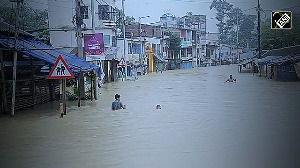Bicycles, car pools and fans are making a comeback into the lives of Japanese people battling soaring oil prices and global warming.
Ties and jackets are also gradually being shed during the summer months by the 'babus' and 'techies' who are going in for half-sleeve shirts in 'Cool-Biz' initiatives.
In line with a slew of energy conservation measures, the environment ministry has asked government officials to adopt 'Cool Biz', a business style to be able to work in offices during the summer months comfortably at 28 degrees celsius.
A ministry report says raising of the preset airconditioning temperature to 28 degrees has brought about reduction in carbon dioxide levels by approximately 1.14 million tonnes which is equivalent to about three million households' one month emission amount.
"Global warming is a very serious challenge," says Tsuruoka Koji, director general of global issues at the Japanese Foreign Ministry. "It transcends national boundaries".
Climate change will be a major issue at the three-day G-8 Summit in Hokkaido to be attended by Prime Minister Manmohan Singh, US President George W Bush and other world leaders beginning from July 7.
In many offices, table fans have been kept as a standby. Car pools have become popular for long distance travellers and the demand for bicycles have shot up considerably.
A survey by the transport ministry says as of March 2008, car ownership was 79 million, down by 0.2 per cent (point two per cent) as compared to the same month last year.
The ministry expects further drop in the sale of new and used cars in the near future.
Private companies are coming forward in sizeable numbers to pitch in the efforts to conserve energy under a novel 'Team-minus six per cent' national campaign to tackle global warming.
Sixteen countries participating in the G-8 Summit account for 80 per cent of the total green house gas emissions with the US and China accounting for a big portion.
Unless, these countries act together to bring down the emission level, the scenario looks grim, warns Tsuruoka Koji.
He says a follow-up to the Kyoto protocol was being discussed by several countries.
Breakthrough technologies are another area under Japan's focus to save energy. The Iceland model is being looked into by Tokyo. Iceland uses geo-thermal energy. Cars in that country use hydrogen and hence there is zero per cent emission.
The changing social fabric over the years from joint family to a nucleus family and increasing individual requirements have also led to stepped up consumption of energy.
While there was one television, one fridge, one car in a huge joint family, now the same number of people are living in three or four different establishments, each requiring all the amenities.
In many homes, each room has a separate TV, he pointed out, adding the number of electrical appliances have shot up in each household.






